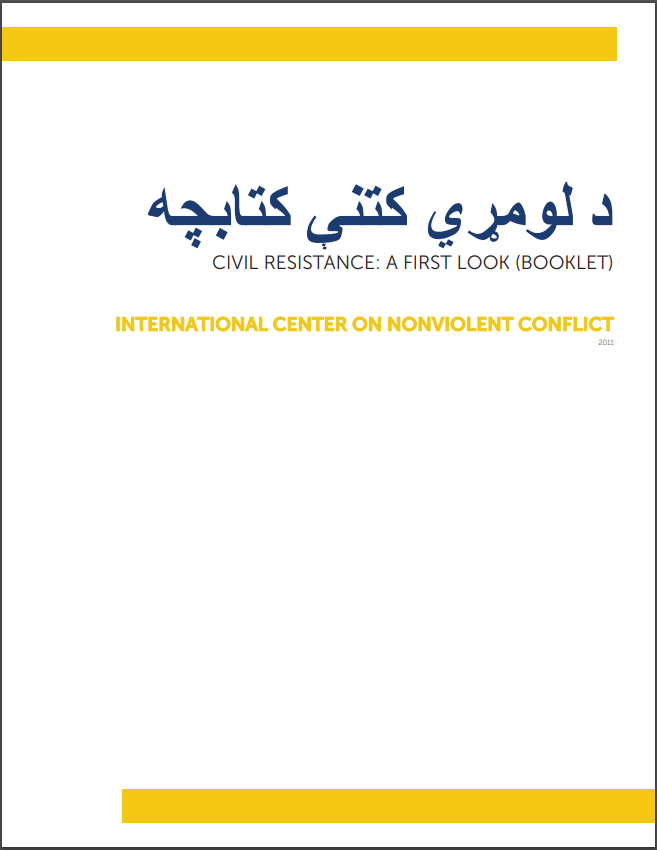What's New
Resource of the Week
 Each week, ICNC will feature a publication, news article, video, blog post or study from our comprehensive Resource Library to keep activists, scholars, journalists and others apprised of key developments in the civil resistance community worldwide. Access and downloads are free. In addition, we will also feature a translation of that resource in a language whose native speakers might benefit from it. This week’s resource is the booklet Civil Resistance: A First Look, and our featured translation is Pashto (د لومړي کتنې کتابچه).
Each week, ICNC will feature a publication, news article, video, blog post or study from our comprehensive Resource Library to keep activists, scholars, journalists and others apprised of key developments in the civil resistance community worldwide. Access and downloads are free. In addition, we will also feature a translation of that resource in a language whose native speakers might benefit from it. This week’s resource is the booklet Civil Resistance: A First Look, and our featured translation is Pashto (د لومړي کتنې کتابچه).
This month tens of thousands of Pashtuns took part in a massive demonstration in the Pakistani city of Peshawar to demand an end to alleged human rights violations at the hands of police and Pakistani security forces. Pashutuns, an ethnic minority in Pakistan that makes up some 15% of the population, have long accused the state of repression, forced disappearances and extrajudicial killings.
The demonstrations have so far remained peaceful, and leading organizers have articulated a strategic commitment to nonviolence. Manzoor Pashteen, one of those leaders, was quoted as saying “There are people who want our movement to turn violent, but we will respond peacefully as we have done so far…(we) should show others that Pashtuns are peaceful despite how much they have endured.”
The instinct is a good one. An emerging field of study is corroborating what activists like Pashteen instinctively know: that nonviolent tactics are quantifiably more successful than violent tactics at both convincing neutrals of the moral superiority of the cause, and engaging a repressive state in ways that neutralize its advantages and amplify its weaknesses. In that spirit, this week’s ‘Resource of the Week’ is the booklet Civil Resistance: A First Look.
Download the booklet Civil Resistance: A First Look
Download Pashto-language Backfire Basics (د لومړي کتنې کتابچه)
2018-19 Curriculum Fellowships
2018-19 CURRICULUM FELLOWSHIPS: Classroom-Based, Online, and Hybrid
As part of our mission as an educational foundation, ICNC promotes the teaching of civil resistance in academic institutions and beyond, whether through classroom-based, online, or hybrid courses. Applicants for ICNC’s curriculum fellowships are expected to develop and teach a full term course on civil resistance. We particularly encourage applications from educators who do not currently teach civil resistance at the institutions where they want to develop the new curriculum unit[…]
DEADLINE FOR ALL CURRICULUM FELLOWSHIPS: MAY 13TH
Click here to learn more about Classroom-Based Course Fellowships
ICNC President Hardy Merriman on Civil Resistance in Ethiopia
 ICNC President Hardy Merriman recently discussed factionalism and nonviolent tactics as applied in Ethiopia as competing factions are increasingly mounting campaigns against government strictures. The interview appeared on Ethiopia TV12 and was videotaped in Washington, D.C.
ICNC President Hardy Merriman recently discussed factionalism and nonviolent tactics as applied in Ethiopia as competing factions are increasingly mounting campaigns against government strictures. The interview appeared on Ethiopia TV12 and was videotaped in Washington, D.C.